![]()
Mon, Sept 26, 2011 | UN TV
FM Walid Al-Moualem Addresses the General Debate of the 66th Session of the General Assembly
Address by His Excellency Mr. Walid Al-Moualem, Minister for Foreign Affairs of Syria at the General debate of the 66th Session of the General Assembly of the United Nations (New York, 21-24 and 26-30 September 2011).
Syria, General Debate, 66th Session
Statement by
His Excellency Mr. Walid Al-Moualem
Minister for Foreign Affairs and Expatriates of the
Syrian Arab Republic
at
The General Debate
of the Sixty-Six Session of the United Nations
General Assembly
NEW YORK
September 26, 2011
Your Excellency Nassir Bin Abdel-Aziz al-Nasser,
President of the 66th Session of the UN GA,Allow me to congratulate you on your election as President of this Session of the General Assembly. I wish you success in your endeavors to promote the interests of our international organization. I salute your predecessor, Mr. Joseph Diess and express to him our appreciation for successfully presiding over last year’s session.
Ladies and Gentlemen,
Allow me first to address the current situation in Syria, our position in regard to this situation and to the circumstances and events unfolding inside and outside the country.
Positions and circumstances of states are undeniably governed by their geopolitical realities and by the constraints and demands stemming therefrom. They are equally influenced by the repercussions they endure, the stances they adopt and the price they pay, be that high or low for their positions towards these questions. The Syrian Arab Republic is located in the heart of the Middle East region. This location determined the major role which Syria played in the balances and politics in the Arab world and the region in general. For many decades, Syria faced major challenges and stood-up firmly against attempts to curtail its role and divert the national course it charted for itself. It is no secret that Syria upheld its national sovereignty and the independence of its national decision. This position has always been one of the primary pillars of Syrian foreign policy.
Ladies and Gentlemen,
Syria spared no effort in support of the legitimate struggle of the Palestinian people and championed resistance movements. Syria upheld its inalienable right to liberate the entire occupied Syrian Golan to the line of June 4, 1967. At the same time, Syria extended a hand of friendship to all states, and built its international relations on mutual respect and reinforcing interests. It used its leverage to serve and promote the centerpiece of Syrian national prerogatives, namely the Middle East question to liberate the land and restore the rights.
Following the occupation of Iraq Syria was dragged into another battle. It had to choose between enduring siege and isolation or submitting to dictates. Again Syria summoned all its must to prevail, despite the exorbitant price we had to pay — at the expense of other priorities and domestic interests. We emerged from this battle having gained strength while preserving the independence of our decision and safeguarding our national prerogatives.
Ladies and Gentlemen,
There are two sides to the problem Syria faces today: on the one hand, the country needs the people-driven political, economic and social reforms. President
Bashar Al-Assad already declared that these reforms are needed and due. He expressed a strong desire to accomplish them. But the force of the political circumstances to which I have briefly alluded earlier forced internal demands — important as they were — to take a back seat to other priorities. Our overriding priority was facing the external pressures which were at times tantamount to blatant conspiracies.On the other hand, popular demands and claims have been manipulated to further objectives which are alien to the interests and express desires of the Syrian people. These demands were the stepping stone used by armed groups to sow discord and sabotage our security. They became the new pretext for foreign interventions. Syria exercised its responsibility to protect its citizens. It acted to guarantee their safety and stability. Vigilance against the danger of foreign intervention that assumes a different form with every passing day, and challenging it does not mean underestimating popular demands. These demands have already been accommodated prior to the recent events. In our view, these are needed reforms that have fallen due. Many of their elements have been already met. Those reforms are a work in progress that will continue through national dialogue in the context of national unity, sovereignty and independence.
Ladies and Gentlemen,
To shed more light on the situation, I will recall at this juncture the statement that President Assad made on June 20 of this year.
In this statement, the President declared reform measures comprising new laws: the Political Parties Act to guarantee political pluralism, the Information Act to lay the ground for free and independent media, the Parliamentary Elections Act and the Local Administration Act. The proposed reform measures were to be culminated by a thorough examination and review of the Syrian constitution. The review would delete certain articles to allow for political pluralism and democratic practices. It may even lead to framing a new constitution that would guarantee all of the above. The constitution is the back bone of the political, economic and social life of states. This reform measure will definitely respond to the popular demands and needs. Furthermore, the President left the door open to views and proposals on the reform effort in general. In a television interview that followed, the President announced that a time line has been set to agree on and implement the proposed reforms in no more than six months. This is an extremely important stance which requires a serious in-depth national dialogue to arrive at the desired mechanisms and results. A comprehensive dialogue began a couple of weeks ago in different Syrian governorates. Representatives of various sectors of the Syrian society including opposition figures joined the process to examine the comprehensive political, economic and social components of the proposed reform package.
Ladies and Gentlemen,
We deeply regret the surge in the activities of armed groups in Syria which have not waned and instead continued to spiral. The presence of these groups, which of itself is the other aspect of the problem in Syria, is the manifestation of foreign intervention. We expected the states that advocate the need for reform and change to support the Syrian official position instead of opting for incitement and defiance. In fact, the more ground we cover towards stability and reform, the stronger the foreign incitement. Armed violence surges in tandem with multiple economic sanctions. By targeting the Syrian economy with sanctions, the United States and the European Union jeopardize the interests and the basic daily subsistence needs of the Syrian people. This course cannot in any way be reconciled with pronouncements about concern for the interests, security and rights of the Syrian people. It further runs counter to the basic principles of human rights in defense of which these States base their interference in our internal affairs. It must be recalled that the Charter of our organization states that “Nothing contained in the present Charter shall authorize the UN to intervene in matters which are essentially within the domestic jurisdiction of any state”.
Ladies and Gentlemen,
Syria provided our region with a model of peaceful coexistence among the different components of the Syrian people, a model which deserves to be emulated. It opted for secularism to promote its national unity in view of the religious and ethnic diversity of the region to which it belongs, a region that was the cradle of divine religions and the birthplace of human civilization.
Any objective analysis of the events in and around Syria will demonstrate clearly that the purpose of the unjust anti-Syria campaign currently underway is to attack this model of coexistence that has been a source of pride to our people. How can we otherwise explain media provocations, financing and arming religious extremism? What purpose could this serve other than total chaos that would dismember Syria — and consequently adversely affect its neighbors? What else could this course achieve other than spreading Western hegemony over the countries of the Mediterranean and serving Israel’s expansionist interests?
I assure you that our people are determined to reject all forms of foreign intervention in their internal affairs. We shall continue pursue security and stability. We shall proceed in implementing the compereneisve program of reform through national dialogue to turn Syria within months into a model of political pluralism and an oasis for peaceful coexistence among the different components of its people.
From this rostrum I call on states which have partaken in the unjust campaign against Syria to reconsider their positions. To them I say our people will foil your schemes.
I also express our appreciation and thanks to the countries that stood by our people’s side in this crisis, pre-empted any harm that could have befallen their interests and encouraged them to pursue their aspirations.
Ladies and Gentlemen,
For years, the international community has considered the two-state solution the basis for establishing peace between the Israelis and the Palestinians.
The negotiations between the two sides continued for years. They have failed though to achieve any progress towards a solution due to Israeli well known positions and measures. Therefore, the international community’s pursuit of the recognition of Palestinian Statehood on the Palestinian territories occupied in 1967 is legitimate. It is a positive step in the direction of restoring all the Palestinian rights. Syria calls on the international community to support this request.
Our position on declaring the Middle East a nuclear weapon free zone is established and known. We continue to call for exercising pressure on Israel to implement international resolutions that have called on it to accede to the NonProliferation Treaty, and submit its nuclear facilities to the IAEA’s safeguard regime. This measure is of extreme importance to the security and stability of our region. We at the same time stress that all states have the right to acquire nuclear technologies for peaceful purposes. This right is guaranteed by the NPT.
We renew the call to lift the embargo that has been enforced on Cuba for decades.
Ladies and Gentlemen,
We aspire to a more just and secure world. This international organization has a major role to play in this regard. It can play this role more effectively if some powerful states gave up attempts to further their own agendas. We still hope that the international community will be able to follow the right course to bring about a better world to which our peoples aspire.



 RSS
RSS

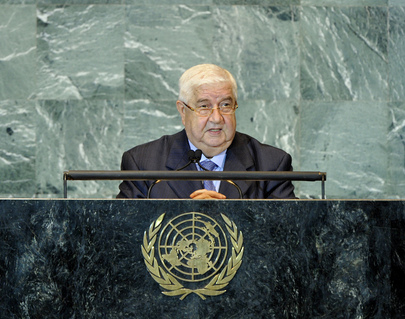
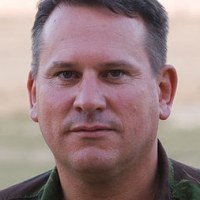
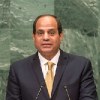
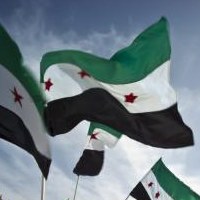
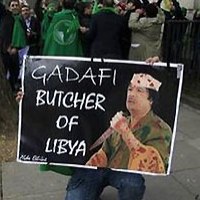





FM Walid Al-Moualem Addresses the General Debate of the 66th Session of the General Assembly | Middl http://t.co/TuUPOchE
http://t.co/NfpOlyju FM Walid Al-Moualem Addresses the General Debate of the 66th …
http://t.co/QT1sJLyH FM Walid Al-Moualem Addresses the General Debate of the 66th …
FM Walid Al-Moualem Addresses the General Debate of the 66th Session of the General Assembly | Middl http://t.co/TuUPOchE